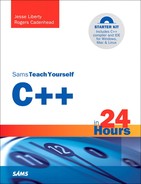Table of Contents
HOUR 1: Writing Your First Program
Compiling and Linking the Source Code
HOUR 2: Organizing the Parts of a Program
HOUR 3: Creating Variables and Constants
HOUR 4: Using Expressions, Statements, and Operators
If-Else Conditional Statements
Declaring and Defining Functions
Using Variables with Functions
Returning Values from Functions
HOUR 6: Controlling the Flow of a Program
HOUR 7: Storing Information in Arrays and Strings
Writing Past the End of Arrays
HOUR 8: Creating Basic Classes
HOUR 9: Moving into Advanced Classes
Interface Versus Implementation
Organizing Class Declarations and Function Definitions
Classes with Other Classes as Member Data
Understanding Pointers and Their Usage
HOUR 11: Developing Advanced Pointers
Accessing Data Members Using Pointers
const Pointers and const Member Functions
Using the Address of Operator on References
Null Pointers and Null References
Passing Function Arguments by Reference
Understanding Function Headers and Prototypes
HOUR 13: Developing Advanced References and Pointers
Passing by Reference for Efficiency
References as an Alternative to Pointers
When to Use References and When to Use Pointers
Don’t Return a Reference to an Object That Isn’t in Scope!
Returning a Reference to an Object on the Heap
Pointer, Pointer, Who Has the Pointer?
HOUR 14: Calling Advanced Functions
HOUR 15: Using Operator Overloading
Part V: Inheritance and Polymorphism
HOUR 16: Extending Classes with Inheritance
Passing Arguments to Base Constructors
HOUR 17: Using Polymorphism and Derived Classes
Polymorphism Implemented with Virtual Methods
How Virtual Member Functions Work
HOUR 18: Making Use of Advanced Polymorphism
Problems with Single Inheritance
HOUR 19: Storing Information in Linked Lists
Linked Lists and Other Structures
HOUR 20: Using Special Classes, Functions, and Pointers
HOUR 21: Using New Features of C++0x
Compile-Time Constant Expressions
HOUR 22: Employing Object-Oriented Analysis and Design
HOUR 24: Dealing with Exceptions and Error Handling
Bugs, Errors, Mistakes, and Code Rot
Writing Professional-Quality Code
APPENDIX A: Binary and Hexadecimal
